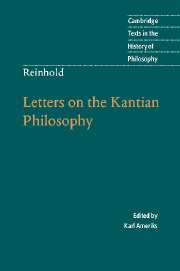Book contents
- Frontmatter
- Contents
- Preface
- Introduction
- Chronology
- Further reading
- Note on the texts and translation
- Letters on the Kantian Philosophy
- First Letter: The need for a Critique of Reason
- Second Letter: The result of the Kantian philosophy on the question of God's existence
- Third Letter: The result of the Critique of Reason concerning the necessary connection between morality and religion
- Fourth Letter: On the elements and the previous course of conviction in the basic truths of religion
- Fifth Letter: The result of the Critique of Reason concerning the future life
- Sixth Letter: Continuation of the preceding letter: The united interests of religion and morality in the clearing away of the metaphysical ground for cognition of a future life
- Seventh Letter: A sketch of a history of reason's psychological concept of a simple thinking substance
- Eighth Letter: Continuation of the preceding letter: The master key to the rational psychology of the Greeks
- Appendix: the major additions in the 1790 edition
- Index
- Cambridge texts in the history of philosophy
Third Letter: The result of the Critique of Reason concerning the necessary connection between morality and religion
Published online by Cambridge University Press: 05 June 2012
- Frontmatter
- Contents
- Preface
- Introduction
- Chronology
- Further reading
- Note on the texts and translation
- Letters on the Kantian Philosophy
- First Letter: The need for a Critique of Reason
- Second Letter: The result of the Kantian philosophy on the question of God's existence
- Third Letter: The result of the Critique of Reason concerning the necessary connection between morality and religion
- Fourth Letter: On the elements and the previous course of conviction in the basic truths of religion
- Fifth Letter: The result of the Critique of Reason concerning the future life
- Sixth Letter: Continuation of the preceding letter: The united interests of religion and morality in the clearing away of the metaphysical ground for cognition of a future life
- Seventh Letter: A sketch of a history of reason's psychological concept of a simple thinking substance
- Eighth Letter: Continuation of the preceding letter: The master key to the rational psychology of the Greeks
- Appendix: the major additions in the 1790 edition
- Index
- Cambridge texts in the history of philosophy
Summary
Confirmation of the rumor that the public presentation of the Critique of Reason is forbidden at a certain German university would not be nearly as unexpected for me as denial of that rumor would have been for you, my friend, who have so little hope in the enlightenment of our age. Is there anything that does not worry you about that faction of religious zealots which is busier than ever and whose members are used to deriving their conviction from any source but reason? I, in contrast, credit the opposing and better faction (the term “faction” taken here in its positive sense) [4] with an ever-increasing upper hand; I do expect, particularly from this side, the fiercest and most effective resistance against the new philosophy without, however, fearing it, even in its strongest outbursts. Just as, through its establishment of rational faith, the Critique of Reason has fallen out of favor with the enthusiasts on both sides – those who in no way accept their faith from reason, and those who, bent on knowledge, do not even want to have faith in reason – so too, through its annihilation of all demonstrative proofs for the existence of God, it will also have to take hold with the enlightened defenders of religion. Along with the late Mendelssohn, these defenders of religion regard demonstrative proofs as the fundamental truths of all religion, or at least they agree with the opinion that “no worshiper of the deity should dismiss the least ground of proof that carries with it even some power of persuasion.”
- Type
- Chapter
- Information
- Reinhold: Letters on the Kantian Philosophy , pp. 28 - 49Publisher: Cambridge University PressPrint publication year: 2006



